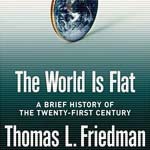Glibalization 3.0: The World is Flat
 The World is Flat: A Brief History of the Globalised World in the 21st Century
The World is Flat: A Brief History of the Globalised World in the 21st Centuryby Thomas Friedman
Penguin/Lane £20, pp496 (paperback edition Rs.491/-) (India)
The rise of China and demise of America is well- trodden literary territory. When tackled by Europeans, it invariably includes a large dose of Schadenfreude. Thomas Friedman, New York Times super-columnist and multiple Pulitzer Prize winner, as his publicists never cease to remind us, thinks differently. He sees as many opportunities as problems for the USA in the irresistible new global world order.
In the crowded market of globalisation books, this is an entertaining, informative and occasionally annoying addition. Rather like Bob Woodward, Friedman cannot resist dropping powerful names, with the grating epithet 'my good friend' applied to ambassadors and politicians alike. He has clocked up many an air mile, travelling to all points on his flat world, but devoting most of his time and energy to the superpowers of the future, India and China.
He defines three eras of globalisation: from Christopher Columbus's first journey in 1492 to around 1800, when the discoveries of new lands shrunk the world from large to medium; from 1800 to 2000, the era of industrialisation to the hegemony of the multinational which made the world small; and the new, flat, tiny world where 'the creation of a global fibre-optic network has made us all next-door neighbours'.
It is the detail and the research that make this book intriguing. Friedman tells us, for example: 'There are 245,000 Indians answering phones from all over the world or dialling out to solicit people for credit cards or cellphone bargains or overdue bills.' These, he adds, would constitute low-wage, low-prestige jobs in America, 'but when shifted to India they become high-way, high-prestige jobs'. He spends some time hanging out at one such monolithic call centre, appropriately called 24/7, talking to the staff about being at the receiving end of American and European strops.
In China, he talks to a few of the army of young people applying for student visas to the US and learns about their tactics for getting into the country. One consular official was charmed by the student who told him: 'My mother has an artificial limb and I want to go to America to learn how to build a better artificial limb for her.' He points to the sheer scale of the Chinese and Indian information revolution, the number of graduates at top US universities on an exponential climb.
America's solution? Americans and, presumably, Europeans (although the continent is almost completely ignored) will have to work harder and tap into the huge new export markets that an upwardly mobile Asia presents. Erecting barriers to goods and services simply will not work. One of the obvious answers, Friedman says, lies in low unit labour costs.
The model is inevitably Wal-Mart, the biggest and most profitable corporation on the planet. Wal-Mart's supply chain is finely honed. During hurricanes in Florida, it knows that people eat more Pop-Tarts, play games that do not need electricity and drink more beer. So they adjust their production lines on the basis of weather forecasts for anywhere in the world. As for the distribution centre, 'a computer tracks how many pallets each employee is plucking every hour to put on to trucks for different stores, and a computerised voice tells each of them whether he is ahead or behind schedule'.
That would be most right-minded people's vision of Hades, but his optimism does not flag. He notes that if China continues on current growth-rate trends, its imports of oil will double by 2012, requiring a new source the size of Saudi Arabia to keep pace. He suggests, vaguely, some kind of crash US-Chinese programme, a latterday Manhattan Project, to develop renewable energy sources. He attaches himself firmly to the Bush administration's free-market, democratisation strictures, but concedes that US actions post-9/11 did not quite endear it to the rest of the world.
Friedman says he is worried for his teenage daughter's generation, deprived of the easy certainties of the 1960s generation. He points, at times uncertainly, to a route map to cope with the twin threats of terrorism and the new economies, but he refuses to make the pessimistic conclusions most others have drawn.
By John Kampfner, the new editor of the New Statesman
http://books.guardian.co.uk/reviews/politicsphilosophyandsociety/0,,1484064,00.html






0 Comments:
Post a Comment
<< Home for More Stories